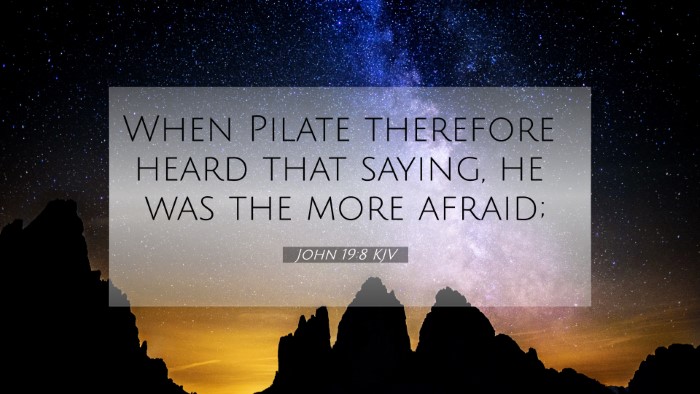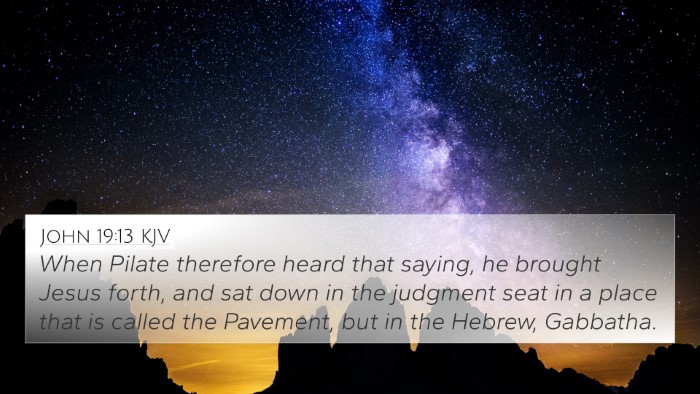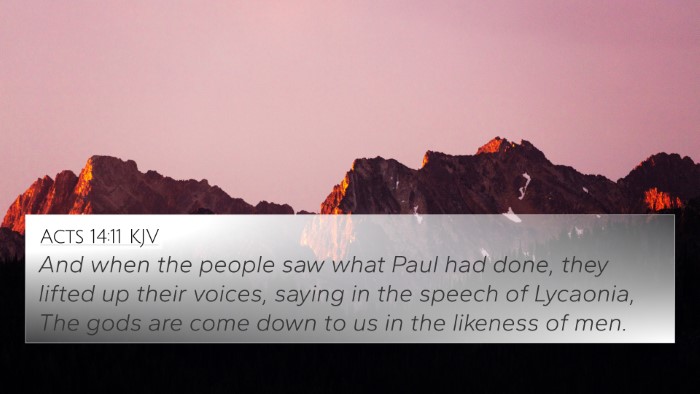Understanding John 19:8
John 19:8: "When Pilate therefore heard that saying, he was the more afraid."
Meaning and Interpretation
This pivotal moment captures the emotional turmoil of Pilate, the Roman governor, in light of the accusations against Jesus. His fear is not simply of the crowd, but of the implications of his decision regarding an innocent man. This reaction illustrates the conflict between political duty and moral integrity.
Insights from Public Domain Commentaries
-
Matthew Henry:
Henry points out that Pilate’s fear stemmed from his awareness of Jesus' unique character and the significance of the claims made against Him. Pilate was caught between the political pressure from the Jewish leaders and the innocence of Jesus, highlighting the moral complexities of leadership.
-
Albert Barnes:
Barnes emphasizes that Pilate's fear indicates his internal struggle. The phrase "the more afraid" suggests a deepening realization of the ramifications of condemning someone who might truly be the Son of God. His fear was compounded by the connection to claims of Jesus' divine authority.
-
Adam Clarke:
Clarke notes that Pilate's fear reflects a moment of crisis. He recognizes the potential spiritual and eternal consequences of his actions. This fear is not just about losing his position but also about offending a higher authority, indicating the serious nature of the events he was part of.
Cross-References for John 19:8
This verse connects with several other biblical passages, enhancing our understanding through cross-references:
- Matthew 27:24 - Pilate washes his hands, symbolizing his attempt to distance himself from the innocence of Jesus.
- Luke 23:4 - Pilate declares Jesus innocent, reinforcing the theme of moral conflict.
- John 18:36-37 - Jesus speaks about His kingdom and truth, which may have contributed to Pilate's fear of the implications of his decision.
- Mark 15:15 - Pilate's desire to satisfy the crowd highlights the tension between public opinion and personal belief.
- Romans 1:18-23 - This passage discusses man’s accountability in recognizing divine truth, paralleling Pilate's struggle.
- Acts 2:23 - Peter’s sermon mentions Jesus being delivered by the predetermined purpose, indicating a divine plan that Pilate is unknowingly part of.
- Philippians 2:10-11 - Every knee shall bow to Jesus, alluding to the greater authority that Pilate fears in his heart.
- Revelation 1:7 - Refers to the one who was pierced, linking back to the crucifixion and heightened fear of repenting for sins.
- Isaiah 53:3 - Discusses the despised and rejected nature of the Messiah, echoing Jesus’ treatment by the authorities, deepening Pilate's fear.
- Jeremiah 26:14-16 - A parallel story of facing the consequences of speaking God’s truth versus evil intentions, similar to Pilate's plight.
Thematic Connections between Scriptures
This verse serves as a cornerstone for a wider examination of the themes of fear, authority, truth, and moral responsibility. The juxtaposition of Pilate’s earthly power against Jesus’ divine truth creates a rich tapestry for understanding the conflict of the Gospels.
- Fear of God vs. Fear of Man: Pilate’s fear symbolizes the danger of valuing human opinion over divine truth, a theme echoed throughout the Scriptures.
- Political Power vs. Spiritual Authority: The conflict faced by Pilate reflects a larger biblical narrative regarding authority and the nature of leadership.
- The Innocence of Christ: The repeated affirmations of Jesus’ innocence across various accounts emphasize the significance of His sacrifice.
- Conscience and Morality: Pilate’s internal struggle embodies the universal conflict between doing what is right versus what is politically expedient.
Comparative Bible Verse Analysis
To deeply understand John 19:8, we can compare it with other relevant verses that touch upon fear, authority, and moral choices:
- Proverbs 9:10 - "The fear of the Lord is the beginning of wisdom," emphasizing the importance of recognizing God's authority over earthly powers.
- Matthew 10:28 - Jesus teaches not to fear those who kill the body, reinforcing the idea that spiritual fear holds more weight than earthly fear.
- 1 John 4:18 - "Perfect love casts out fear," pointing to the remedy for fear that Pilate struggled with regarding Jesus.
- Acts 5:29 - "We must obey God rather than men," highlighting the conflict between divine authority and human authority evident in Pilate's decision-making process.
- Hebrews 10:31 - "It is a fearful thing to fall into the hands of the living God," reinforcing the ultimate accountability one has before God, which Pilate may have sensed.
Tools for Bible Cross-Referencing
To explore these themes and connections, various tools and methods are available for deeper study:
- Utilize a Bible concordance to find related verses.
- Consider a cross-reference Bible study to examine connections between verses.
- Implement a Bible cross-reference guide to follow thematic links.
- Explore resources on how to use Bible cross-references effectively for personal study.
- Familiarize yourself with a Bible chain reference system to track key ideas throughout scripture.
Inter-Biblical Dialogue and User Intent
This verse poses critical questions for the reader about the interconnectedness of various scriptures and their meanings:
- What verses are related to Pilate's fear in John 19:8?
- Find cross-references for this verse to explore its broader implications.
- How do the verses in Matthew and Luke connect with John's account?
- What similarities exist between Pilate's judgement and other biblical figures faced with moral choices?
Conclusion
John 19:8 offers profound insight into fear, authority, and moral dilemmas in biblical narratives. Through cross-referencing and thematic connections, one can grasp a more comprehensive understanding of Pilate's struggle, as well as the overarching message of the Gospels regarding Jesus’ innocence and the ramifications of human choices in the face of divine truth.




